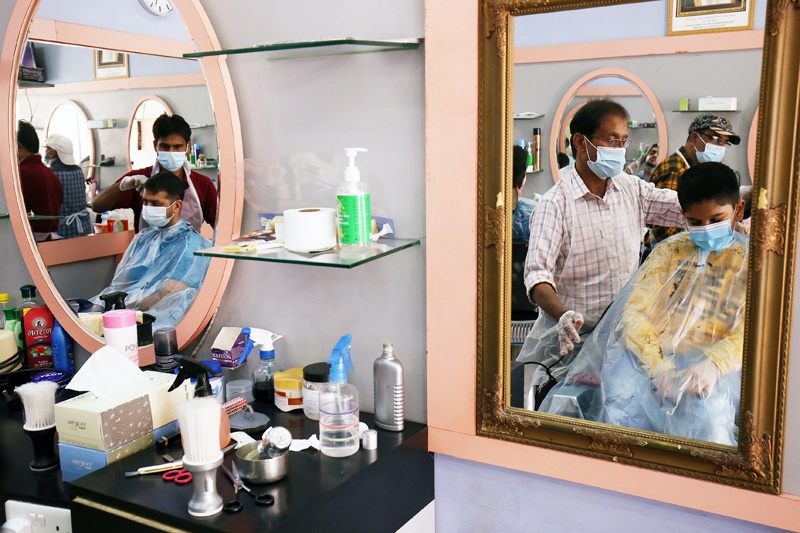 KUWAIT: Mask-clad Kuwaitis get haircuts at a barber shop in Kuwait City on February 4, 2021. - Photo by Yasser Al-Zayyat
KUWAIT: Mask-clad Kuwaitis get haircuts at a barber shop in Kuwait City on February 4, 2021. - Photo by Yasser Al-Zayyat
By Ben Garcia
KUWAIT: Elizabeth was barely a month into her new job in Sabah Al-Salem as a hairstylist and manicurist, but she is now out of work once more, after Kuwait again shut down all salons, barbershops, spas and gyms due to the rising number of coronavirus cases in the country.
On Saturday, Kuwaiti salon owners demanded the government to reconsider its decision, as they argued it will again badly affect their businesses. They stressed the decision by the Cabinet was unfair and will only worsen the economic suffering of both employers and workers.
Elizabeth only returned to work in Aug 2020, after almost six months due to a series of curfews and lockdowns. But the income of the salon was drastically affected and started to deteriorate, leading to the complete closure of the business by November. "We tried to revive the salon, but were unable to salvage it. The owner decided to close the salon and went back to Jordan. We were told to look for other opportunities, but it's hard to find a good employer. I was called for many trials - one day, two days here, one week there. I spent two months without any income," she told Kuwait Times.
Elizabeth finally decided to accept an offer from a salon that offered her a lower salary compared to her previous job. "My visa was transferred immediately, and at the beginning of January, I started working with them. But now here we are again without work," she said. She is now receiving a salary of KD 300 compared to KD 400 at her previous job. "Before corona, money was really easy in salon work. But we are facing a very drastic crisis, so we just have to bear with it, at least for now."
Yesterday, Elizabeth woke up late, and in a bad mood. "I do not know how long I will stay at home again without a job. I hope by tomorrow we will be able to go back to work," she said. But she expressed joy after hearing from her boss that they will still receive half of their salaries.
Elizabeth has four children, all in private schools back in the Philippines. She wants to work so she can help her husband in providing for her family. Her husband, who is a farmer, barely makes enough. "My only wish is to be able to provide for my family and send them to school. I am 46 years old and want to go back to them in 4-5 years; I miss them so much!" she said.
Daily earning
Jonathan is a barber in Salmiya, who unlike Elizabeth, earns money on a daily basis. He charges KD 2 per customer - one dinar goes to his employer and another to his pocket. "We are only earning if we have customers. Workers at ladies' salons have a regular monthly salary, but at men's barbershops, the payout is normally half-half. We can also make an additional KD 20 or KD 30 in tips for good service," he told Kuwait Times.
"With the closure of the shop, we are going to struggle to pay for rent, food and remittance," Jonathan said. He added he will accept house service calls to maintain the flow of income while they are not allowed to operate.
Isidro, who works as a masseur, is in an almost similar situation. But his boss told his colleague and him to provide home services, or they will not be paid. "Now I am at home waiting for calls from my regular clients. Since we are not allowed to do our regular job at the spa, we will take our service to our clients' homes," he said.
The Cabinet had decided last Wednesday to shut down all commercial shops, restaurants and malls from 8:00 pm to 5:00 am the next day, as a new measure to help curb the spread of COVID-19 after a notable increase in the number of new cases over the past few days. Grocery shops and pharmacies were exempted, while delivery business were allowed to continue.
It also closed down health clubs, salons, barber shops and resorts, in addition to celebration halls, tents and catering services. It also banned all gatherings including national holiday celebrations. The ban started yesterday and will continue for one month which can be renewed if necessary.
The council of ministers also banned the entry of foreigners into the country from February 7 for two weeks that can be renewed. It exempted close relatives of citizens and domestic helpers. Furthermore, the Cabinet re-introduced institutional quarantines saying that those returning will have to be quarantined at local hotels for seven days and then at home for another seven days. The decision will be implemented from February 21 for one month that can be extended.




